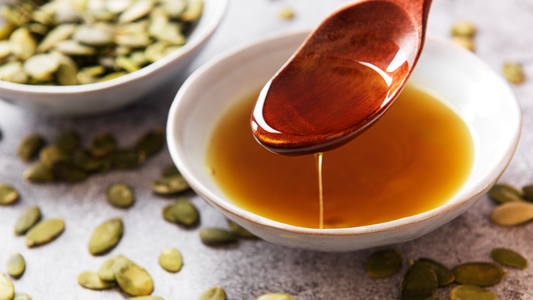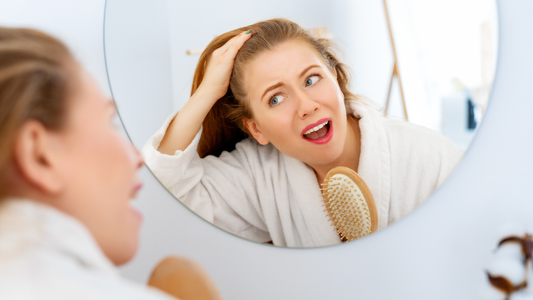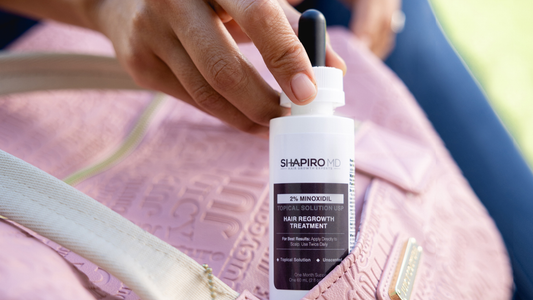If you’re struggling with a receding hairline, baldness or thinning hair, you’re certainly not alone.
Twenty-five percent of American men notice hair loss by the age of 21, according to the American Hair Loss Association, and 85% experience it by the time they reach 50. Women are also affected and account for 40% of Americans experiencing hair loss.
Fortunately, prescription and non-prescription medications can help. Topical minoxidil is a common treatment for men and women, and many men take finasteride, the only pill approved by the FDA for male pattern hair loss.
Of course, those are only a small sampling of the options available to individuals with thinning hair. In fact, it’s become extremely common to use fullness-boosting shampoos and conditioners to compliment these medications, and the right hair loss shampoos and conditioners pair well with these medications to promote that healthier head of hair. After all, you wash your hair anyway; why not use a formula that can help prevent and reverse the appearance of hair loss?
Here are recommendations on ingredients and reasons to check out shampoos for hair loss.
What Causes Hair Loss?
The two most common causes of hair loss are heredity and age. It’s all in your genes.
Most men and women dealing with hair loss have a condition known as androgenic alopecia. This means their hair follicles have a genetically-predisposed sensitivity to androgen (sex) hormones like testostereone and dihydrotestosterone (DHT). DHT, a hormone present in both men and women, is largely to blame for most hair loss.
In both cases, hair follicles start to shrink and eventually stop growing new hair as DHT “acts” on them throughout your life. While this happens generally as we age, it’s really the genetic predisposition that causes the sensitivity in the first place. Hair loss can also be caused by poor circulation, inflammation, or the buildup of sebum (your skin’s natural oils) in your scalp.
Other hair loss culprits include poor nutrition, which can rob your hair of the nutrients it needs to grow. Excessive heat styling and chemical hair care products can also damage your hair and stunt healthy growth.
The good news is, early treatment can slow the rate of hair loss and even help you regrow thinning hair. In order to find the appropriate treatment, it’s important to identify the external or internal culprits that are causing you to lose hair.
Do Hair Loss Shampoos Work?
Specialty shampoos can help fight hair loss in various ways. Many include ingredients shown to fight those harmful hormones and increase blood flow in your scalp. Other ingredients moisturize and strengthen the hair shaft or clear away whatever is clogging hair follicles.
According to the Mayo Clinic, hair loss shampoos can be effective at slowing hair loss and facilitating the regrowth of hair, particularly if you start using a quality formulation at the first sign of the problem.
However, these products need to be used regularly and given sufficient time to work. To find the best shampoo for hair loss, it’s important to identify what’s causing your problem.
What Ingredients Work in Hair Loss Shampoos?
Hair loss shampoos made from natural and clinical-strength ingredients can treat inflammation on the scalp or damage to the hair follicle and help hair grow again.
Some work to block the effects of the DHT hormone, while others are intended to improve blood flow and clear debris from the scalp.
Here are the most effective ingredients found in some of the best shampoos for hair loss.
Aloe Vera
Aloe vera helps nourishes your scalp to create a more optimal environment for healthy hair growth. Its anti-inflammatory properties take care of issues at the scalp and help to normalize pH levels. The enzymes in aloe vera can stimulate growth by opening hair follicles and pores.
Argan Oil
Argan oil is a common ingredient in many haircare products, and for a good reason. It moisturizes the scalp and hair and can repair damaged strands. This makes it a particularly effective solution for hair loss caused by chemical or heat damage. Argan oil can also improve blood circulation and support more balanced hormone levels, making it easier for your scalp to regrow hair.
Biotin
Biotin is one of the B complex vitamins that does double duty for those suffering from hair loss. Not only does it strengthen your hair follicles, it also increases the elasticity of strands, preventing excessive breaking and splitting
Caffeine Extract
Just like your morning coffee gives you a jolt of energy, caffeine stimulates the scalp and hair follicles, helping new strands grow at a faster pace. It also opens up your hair follicles so they better absorb topical products to give you maximum results. If your hair loss is caused by poor circulation at the scalp, topical caffeine is your best friend. It boosts blood flow to supply the cells in your hair follicles with the nourishment they need to thrive. There’s also evidence that caffeine is effective at blocking the action of the DHT hormone. This is especially beneficial to those in the early stages of hair loss.
One 2018 study found that a topical hair loss solution containing caffeine achieved almost the same hair growth results as a 5% minoxidil over a 6-month period.
EGCG
Another effective shampoo ingredient for blocking DHT is epigallocatechin gallate, an extract from green tea. This extract, which is also known as EGCG, can block the hormone from forming and keep it from binding to hair follicles. It also helps prolong the length of your hair’s natural growth phase, and soothes your scalp with its anti-inflammatory properties.
Ketoconazole
Ketoconazole controls microflora on the scalp thanks to its strong anti-fungal and anti-inflammatory properties. This provides hair follicles the nourishment they need to grow hair again. At higher concentrations, ketoconazole is available by prescription only, but you can also find this ingredient at 1% concentrations in non-prescription shampoos.
Red Clover
The anti-inflammatory actions of red clover can help reduce irritation in your scalp and may help to prevent DHT from harming healthy hair follicles. This helps slow down hair loss while giving your hair a stronger, more voluminous appearance overall.
Rosemary
Rosemary speeds up hair growth by strengthening the roots, boosting circulation and even treating dandruff. It’s also an effective tool for relieving stress. Many users report that this pleasant fragrance relaxes them as they shampoo.
Saw Palmetto
While saw palmetto has been used in folk medicine for centuries, it’s recently become a common ingredient in specialty hair cleansers. It’s a fruit extract from berries containing antioxidants that can help eliminate inflammation. But more importantly, saw palmetto is a DHT blocking ingredient. By reducing the body's production of DHT when ingested, and preventing DHT from acting on hair follicles when applied topically, saw palmetto is a key ingredient to look for in hair loss shampoos.
But saw palmetto isn’t suitable for everyone. Physicians generally advise women who are pregnant, breast-feeding, or trying to conceive to refrain from using formulas containing saw palmetto
Tea Tree Oil
Tea tree oil is another common shampoo ingredient. Its natural antiseptic and anti-fungal properties help clean your scalp by removing buildup that may be stunting hair growth. That includes hair styling products as well as sebum and dirt.
Adding a shampoo containing one or more of these helpful ingredients to your hair care routine can help you fight that receding hairline, thinning hair, or bald spot.
At Shapiro MD, we were conscious to include DHT-fighting ingredients like saw palmetto, EGCG, and caffeine in our popular shampoo and conditioner. These formulas were created specifically for ease-of-use and effectiveness, and over 300,000 men and women have used Shapiro MD Shampoo and Conditioner to fight visible hair loss and achieve fuller-looking hair. We also help men and women get prescription and clinical-grade formulations from the comfort of home through our online consultation process. It’s fast, easy, and affordable. Start your hair regrowth journey today by clicking here.
Sources:
https://www.americanhairloss.org/men_hair_loss/introduction.html
https://www.americanhairloss.org/women_hair_loss/introduction.html
https://www.aad.org/public/diseases/hair-loss/causes/18-causes
https://main.shapiromd.com/blogs/how%20to%20block%20dht
https://newsnetwork.mayoclinic.org/discussion/mayo-clinic-q-and-a-treating-hair-loss/
https://www.healthline.com/health/ketoconazole-shampoos
https://www.ncbi.nlm.nih.gov/pmc/articles/PMC5804833/
https://www.ncbi.nlm.nih.gov/pmc/articles/PMC3262531/
https://softerhair.com/natural-shampoos-that-support-hair-growth/




